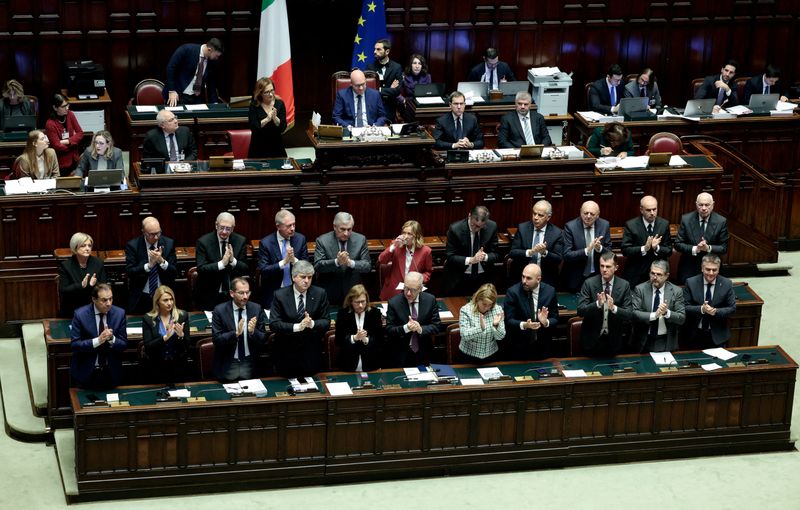By Antonella Cinelli and Valentina Consiglio
ROME (Reuters) - Italy's uncharacteristic political stability is likely to boost its government bonds next year, analysts say, as uncertainty over Germany and France undermines investor confidence in them.
While most of the risks that have made Italian bonds the euro zone's highest-yielding remain, markets are focused for now on the opportunities Rome's 2.5-trillion-euro ($2.62 trillion) debt market, one of the world's biggest, has to offer.
Although the euro zone's third-largest economy has ground to a halt and its debt pile - the second largest in the currency bloc - is forecast to rise further through 2026, for many investors French and German strife appears more immediate.
"Italy is no longer considered the sick man of Europe," said Christopher Dembik, senior investment adviser at Pictet AM.
As long as that view prevails, Italy will enjoy lower debt costs. The stakes are high, with Rome likely to sell 300 billion to 310 billion euros of medium- and long-term bonds next year.
The yield gap between Italy's benchmark BTPs and German Bunds narrowed this month to a more than three-year low. And with Germany near recession, bond specialists expect this trend to continue and perhaps accelerate.
Markets also view Italy's relatively high-yielding BTPs as an attractive alternative to French OATs, as Paris grapples with budgetary and political upheavals.
Japanese investors in particular are now switching from French to Italian debt, Dembik said.
RISKS
Italy's government is under EU orders to slash its deficit, but markets see the curbs planned by Prime Minister Giorgia Meloni, firmly in power after two years in office, as more convincing than the chaos in France.
With yield spreads tightening across the euro zone, Althea Spinozzi, head of fixed income strategy at Saxo Bank, said a previously "unthinkable" narrowing of the BTP-Bund spread to zero was now possible.
However, headwinds could knock such a scenario off course.
Italy's weakening economy could undermine its promised fiscal consolidation, diminishing yields due to ECB rate cuts might make Italian paper less attractive, or a return to global risk-off sentiment could hit BTPs.
Another risk is France itself, Aymeric Guedy, co-manager of French asset management firm Carmignac, told Reuters.
"So far the French political and fiscal crisis has had no impact on broader European spreads, but if it accelerates and turns into a financial crisis then BTPs will not be immune," Guedy said.
And while most analysts forecast firm demand for BTPs through 2025, few share Spinozzi's scenario.
UniCredit strategist Francesco Maria Di Bella said the BTP-Bund spread, which hovered around 115 basis points on Wednesday, is unlikely to fall below 100 bp.
Germany, hit by an industrial slump that could worsen due to tariffs promised by U.S. President-elect Donald Trump, is on track for a second straight year of economic contraction in 2024, with an election looming in February.
RATINGS
Credit ratings agencies, meanwhile, could play a significant role in 2025, analysts said, forecasting tighter spreads may trigger upgrades for Italy and other peripheral countries.
"The agencies may find it easier to reward than to punish," said BBVA (BME: BBVA ) fixed income strategist Filippo Mormando.
Fitch and DBRS raised Italy's outlook to positive in October, while leaving its rating unchanged. Moody's (NYSE: MCO ), which unexpectedly downgraded France this month, still rates Rome just one notch above junk, but with a stable outlook.
Another important factor determining Italy's fortunes will be whether it can continue to meet the policy "milestones and targets" to receive tens of billions of euros from the European Union's post COVID-19 Recovery Fund, analysts say.
So far, Rome has qualified for regular instalments, but has performed more poorly in productively investing them.

"Growth in 2025 will depend crucially on how well the Recovery Fund money is spent," said ING senior economist Paolo Pizzoli.
($1 = 0.9525 euros)
(Graphics by Stefano Bernabei, Editing by Gavin Jones and Alexander Smith)

